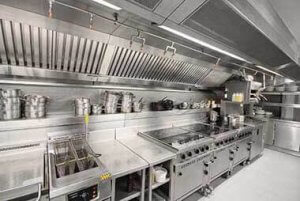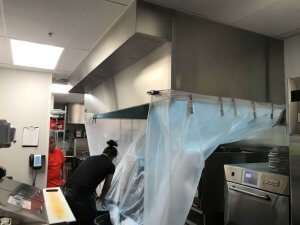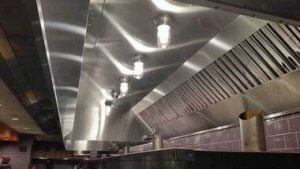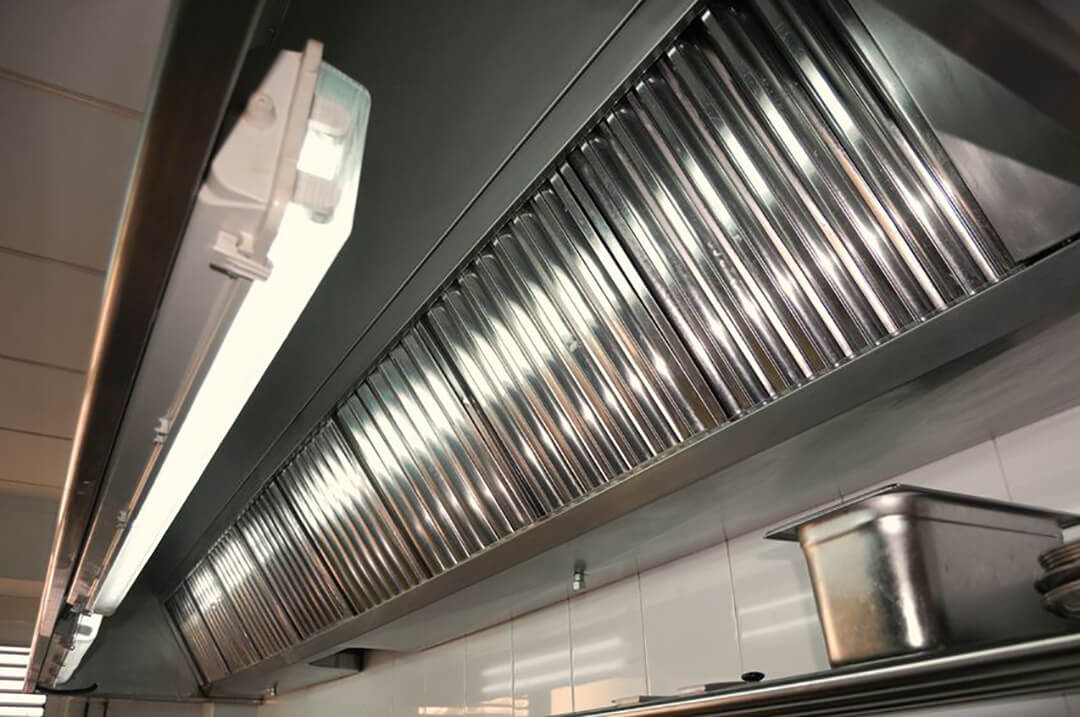 Are you cleaning your filters on a regular basis? Do you wait to have your hood cleaned by a professional? I am an owner of a hood cleaning company and highly recommend a professional cleaning on a regular basis.
Are you cleaning your filters on a regular basis? Do you wait to have your hood cleaned by a professional? I am an owner of a hood cleaning company and highly recommend a professional cleaning on a regular basis.
First, you should know that some hood cleaning services don’t actually clean your filters. They just wipe them off and place them on the side, while cleaning the hood and duct.
While our team regularly cleans filters, if you don’t do it yourself you aren’t really maintaining your system’s efficiency. You can let your filters sit for months without cleaning them. The grease can become a sticky substance that can make it resemble rubber.
A Terrible Example
We were assigned to clean the hoods at an Italian restaurant in the suburbs. However, the owner insists that his hoods only need cleaning once or twice a years and that he has never allowed his staff to clean them.
We arrive on-site to clean the hood. One of the first things that we do is pull the filters down and move them to a washing area. The filters were almost three times as heavy as they would have been if we had not pulled them from this particular restaurant.
Huge chunks hardened grease were pushed from the hood filters while cleaning. They were called “grease-worms” because of their unusual shape. They didn’t respond to heat or high pressure water. It took over 4 hours to clean the filters. The restaurant owner was also impressed by the pile of grease worms we left behind.
Because the filters weren’t working anymore, the inside was filthy and covered in grease. It was similar to the grease you would find in the duct. The roof’s grease containment system was also overwhelmed. The roof was badly damaged, and we spent many hours cleaning it.
Price to clean: $1500 each six months
Better Way
One of our clients was a burger chain. We cleaned the hoods at 27 of their locations in the area. This client, unlike the fast-food burger chains, did not own its own buildings. They had their stores located in strip centers.
It was a firm rule that every Thursday night, the restaurant kitchen and dining hall had to be completely ripped down and cleaned. They also took down the hood filters and cleaned them in the sink.
We only had to do a simple job of degreasing the filters and polishing them when we cleaned their Hoods. Because of this, cleaning their ducts was much easier.
Price per cleaning: $400 every 3 months.
Can Employees Clean the Commercial Hood Filters by Themselves?
Yes. It should be done weekly. A dozen filters would require less than 30 seconds to clean in commercial sinks.
These are the Real Reasons Your Staff Should Clean Your Hood Filters.
Restaurants’ first line defense is the hood filters. They manage grease and ensure the exhaust ventilation system lasts a long time. The building could catch fire and the excessive amount of grease fumes and smoke could cause serious health problems. These essential components of the hood exhaust system must be kept clean and functional.
Commercial hood filters are made out of high-quality, durable materials like stainless, galvanized, and aluminum. But, these materials can become caked with grease over time, which must be removed.
Commercial hood filters can either be cleaned manually, in a commercial dishwasher, and/or in a soak tank. Each method offers its own advantages and disadvantages in terms of time, efficiency and cleaning quality.
Dishwasher Technique:
If you are using a commercial dishwasher, make sure to clean all residue off the filter before you place it in your appliance. Then, run it at maximum temperature with soapy water. Avoid harsh, corrosive chemicals, such as bleach or other cleaners.
This method can be used for quick cleaning during the day. However, it requires some manual labor to remove exterior residue. If not done correctly, it could cause damage to your commercial dishwasher. Also, using the wrong chemicals could cause damage to your commercial-hood filters. This can make them vulnerable to rust.
Method for Soaking Tanks:
Although it’s the most straightforward method, the soak tank is the most time-consuming. To do this, fill the soak tank with water and a non-corrosive metal-safe cleaner. Next, place the filters in the soaker tank and allow them to rest for at least 24 hours. The filters can be taken out and rinsed with water.
Hand Wash Hood Filter
Hand washing is the most labor-intensive, but it’s the best way to ensure that your commercial hood filters are free from grease and residue.
To do this, heat some water in a commercial kitchen sink. Add a little metal-safe degreaser to the water or soap. Allow the filter to soak in the liquid for 30 minutes if you are using the degreaser.
After the liquid has dried, you can scrub the filters by hand using a sponge or scrubber that is non-abrasive. For this purpose, you should avoid bleach and other harsh chemicals.
Summary
Exhaust Hood systems can be complex, expensive and require specialists to clean and maintain. There are some exceptions.
Commercial hood filters can be cleaned by employees without the need for professional assistance.
Owners or employees are prohibited from cleaning other areas like the exhaust fans, hood duct, exhaust hood or exhaust fans. It is also recommended that professionals replace damaged components in your commercial exhaust hood system such as belts.
Restaurants that don’t allow professional hood cleansers to do their work could face severe fines or closure.
Clean commercial hood filters are cooler than those that have been clogged with grease or other residue. This is crucial for employee comfort, as these high-heat appliances are used for hours in the kitchen.
Comments:
 Cleansing commercial hood filters should not take more than 45-45 minutes per employee. However, it is vital to ensure the integrity and health of your exhaust hood system. Grease buildup within a commercial exhaust duct system can cause fires in restaurants, even though it is entirely preventable with daily or weekly cleaning.
Cleansing commercial hood filters should not take more than 45-45 minutes per employee. However, it is vital to ensure the integrity and health of your exhaust hood system. Grease buildup within a commercial exhaust duct system can cause fires in restaurants, even though it is entirely preventable with daily or weekly cleaning.
Do not wait until the grease and other residues have built up on your commercial hood filters before you start cleaning them. This equipment is essential to your restaurant’s cleaning routine. It will ensure that they are sparkling clean at the start of each service.
“Commercial Kitchens are more susceptible to fire than other types of kitchens due to their chaotic environment and numerous fire hazards.”
You’ve found the right article if you work in a commercial kitchen, and want to learn how to clean range hood filters.


